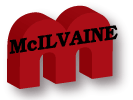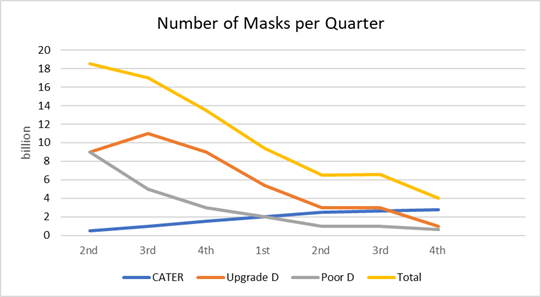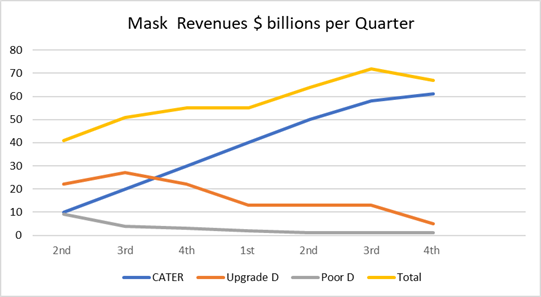
CATER Mask
Decisions
January 6, 2021
California Requires
Face Masks in All Businesses
$240 Billion Mask
Market
Freudenberg Offers
a Type II Medical Mask with Nose Clip for
Individual Adjustment
Medicevo Graphene Face Mask is Reusable for 15
Days
MHI Now Offers Four Layer Face Masks
______________________________________________________________________________
California Requires
Face Masks in All Businesses
California recently enacted its own extensive
COVID-19 emergency rules for business and
industry.
Issued in late November by the California
Occupational Safety & Health Standards Board,
the regulations apply to all places of
employment except for:
-
Those with employees working at
home
-
Those with only one employee who
has no contact with other people
-
Those already covered by
Cal/OSHA’s aerosol transmission
standard
Employers must provide face masks and require
workers to wear them, and they must separate
employees by six feet or install cleanable solid
partitions. They have to implement cleaning and
disinfection procedures and maximize ventilation
with outside air, to the extent that it's
feasible.
Employers need to report and keep records of
COVID cases, exclude exposed or infected workers
from the workplace, provide free testing during
COVID-19 outbreaks or "major" outbreaks (the
number of cases in a specific time period
determine the definition as well as mitigation
and testing requirements), and create
return-to-work criteria. Employees
are entitled to paid time off if they are
excluded from the work place because of exposure
or infection.
In addition, if employers provide transportation
or housing to their employees, they also must:
·
Use higher efficiency air filters in mechanical
ventilation systems, if possible
·
Protect workers using employer-provided housing
and transportation.
$240 Billion Mask Market
We are now making forecasts of the number of
masks and revenue for several mask types to be
used in public places.
It is proposed that the economy of the world be
reopened based on a safe bubble concept. Any
facility operating in a safe bubble could resume
near normal operations. The advantage is instant
implementation. The local government would be
quick to allow the fitness center or school to
reopen with full occupancy if the safe bubble
could be achieved. Let’s address the hurdles to
insuring maximum impact in 2021.
-
Hurdle 1 - Regulatory framework:
Instant acceptance of the safe
bubble initiative is likely.
-
Hurdle 2 - Ability to deliver: A
mix of upgraded disposable and
reusable masks reduce
numbers to an achievable
target.
-
Hurdle 3 - Funding:
In wealthy countries the
promise of near normal operation
will be a sufficient driver.
In poor countries
subsidies will be needed.
Disposable masks create two problems. One is
media availability and the other is a tight fit.
An alternative is Comfortable,
Attractive, Tight Fitting, Efficient, Reusable
masks (CATER Mask). Production could be ramped
up quickly. The wealthy countries can
afford these masks
and will consume the bulk of them in the
early months. As the vaccine takes effect and
mask demand diminishes CATER masks can be
supplied to the poorer countries. Long term
there would be increased use for air pollution
and wildfire protection.

CATER mask suppliers
could quickly ramp up delivery to wealthy
countries with the assurance that the poorer
countries and non COVID demand would provide a
longer term market.
This strategy would put severe strain on
suppliers to scale up to meet the demand in the
needed time frame. It also provides no short
term solution for the poorer countries.
The most effective strategy will be to upgrade
disposable masks to insure a tight fit and to
use these in combination with CATER masks.
Projections have been made on the assumption
that
three billion people will be wearing
masks for the next two years.
The number of people wearing poor
disposable masks will be reduced from 1.5
billion in the second quarter to less than 100
million by the end of 2022.

In the second quarter of this year over 1
billion people would be wearing
upgraded disposable masks with auxiliary
seal devices. CATER Masks would be worn by 1.4
billion people in the fourth quarter.
CATER masks can be worn for up to 90 days.
Upgraded disposable masks could be worn for
shorter periods. The life of the poor disposable
masks is highly variable.
Here are the estimated number of masks
and revenues by mask type.
|
Mask Type |
Number per Quarter |
Cost per Mask |
Revenues per Person per Quarter |
|
CATER |
1 |
$20 |
$20 |
|
Upgraded Disposable |
9 |
$ 3 |
$27 |
|
Poor Disposable |
6 |
$ 1 |
$6 |
The following graph shows the number of masks
per quarter. The total would decrease from 18
billion in the second quarter of 2021 to just 4
billion by the end of 2022. At that point there
would be 2.8 billion CATER masks produced per
quarter.

Mask revenues would rise to $40 billion in the
second quarter. Upgraded disposable revenues
would peak in the third quarter and then
steadily drop as the CATER capacity grows.

CATER mask revenues would rise to $60 billion in
the fourth quarter of 2022. This would include
substantial sales for protection from wild
fires, and other air contaminants. It would also
include considerable revenues for courtesy
masks.
Mask revenues of $240 billion per year are an
order of magnitude higher than any previous
filtration market.
But never has a filter been mandated for
all the people in the world. Millions have died
and trillions of dollars in economic activity
lost due to the absence of tight fitting
efficient masks. The filtration industry has a
unique opportunity to rectify the situation.
Freudenberg Offers
a Type II Medical Mask with Nose Clip for
Individual Adjustment
Freudenberg Filtration Technologies has
developed a high-quality mask that has now been
certified as a TYPE II medical face mask (EN
14683). It combines effective health protection
with first-class wearing comfort. Freudenberg
has completed all the necessary certifications
within just a few weeks. Companies are able to
purchase large quantities from the middle of
October.
“At the heart of our medical face masks is a
soft three-layer polypropylene filter medium
that is characterized by its superior
breathability,” explains Dr. Thomas Caesar,
director Global Filter Engineering Industrial
Filtration.
To effectively protect exposed individuals, the
special structure of the three layers reduces
the release of aerosols contaminated with
viruses and bacteria. External laboratory tests
confirm a filtration efficiency of more than 98%
in aerosol separation.
The soft nonwoven fabric also offers optimum
wearing comfort and facilitates easy breathing.
The independent dermatological institute
Dermatest has rated the product's skin
compatibility as "excellent." Elastic ear loops
and a nose clip allow Freudenberg Filtration
Technologies' mouth-nose protection to be
individually adjusted and ensure a comfortable
fit. This complete “Made in Germany” package
makes the masks a comfortable companion in
everyday working life.
An important factor for the paint industry is
that the medical face masks are LABS-compliant
in accordance with standard 24364 (test class B)
of the German Engineering Federation (VDMA).
This means that employees can safely wear them
even in industrial painting environments, as
they do not cause contamination with substances
that impair paint wetting (LABS).
Freudenberg Filtration Technologies only
supplies its certified face mask to companies
that order 7,500 units or more. For small
household quantities, Freudenberg Home and
Cleaning Solutions also sells the medical face
masks under the Collectex brand to consumers and
companies from mid of October.
Medicevo Graphene Face Mask is Reusable for
15 Days
Medicevo Corporation, a subsidiary of Corporate
Universe Inc., has launched its Graphene Face
Mask, which it says is proven to filter 98
percent of COVID-19 particles. Medicevo’s
Graphene Face Mask has been evaluated using the
American Society for Testing and Materials
(ASTM) standards for medical face masks.
Medicevo’s Graphene Face Mask uses a patented
production process that implants graphene into
the fabric of the mask directly, creating a
microscopic sharp-edged netting. When a virus
comes in contact with Medicevo’s Graphene Face
Mask, the graphene netting slices through the
virus particle, killing it. The masks are
scientifically proven to kill COVID-19 particles
and other types of infectious diseases like the
seasonal flu, which is key for disease control
and prevention.
In order to be approved by the U.S. Food and
Drug Administration for use in hospitals, PPE
must pass tests for flammability, differential
pressure, particle filtration efficiency and
bacterial filtration efficiency (BFE), and fluid
resistance. Medicevo’s Graphene Face Mask has
passed flammability testing and has scored a 4.2
out of 5 for differential breathability
pressure. In addition, the masks scored a 98
percent BFE and a 96 percent particle filtration
efficiency. The masks have passed level two for
fluid resistance.
“Our collective understanding of COVID-19 has
greatly expanded since the start of the
pandemic, as well as how to protect ourselves,”
said Isaac Sutton, president, Medicevo
Corporation. “Medicevo has taken the most
advanced graphene technology and perfected the
process of infusing it into our face mask’s
fabric to create a PPE that is safer than the
N95 respirator, which was widely considered the
gold standard of safety until this point.”

Medicevo’s Graphene Face Mask features four
layers of protection. The outer layer comprises
high-quality antibacterial, non-woven fabric
with strong air permeability but isolates
droplets and large particles. The graphene layer
and patented plating technology kill more than
99 percent of viruses and germs. A melt-blown
cloth layer creates an isolation and dustproof
effect, filtering particles less than 0.3
microns in size. Finally, a skin-friendly inner
lining with honeycomb-woven fabric and
adjustable ear loops stretch over the wearer’s
nose and mouth to ensure a secure and airtight
fit.
Medicevo is the exclusive distributor of the
state-of-the-art Medicevo Graphene Face Mask in
the United States and Canada. The masks are
reusable for up to 15 days.
MHI Now Offers Four Layer Face Masks
Mitsubishi Heavy Industries Thermal Systems
Ltd., part of Mitsubishi Heavy Industries (MHI)
Group, will sell Beaver branded facemasks to the
Japanese market. The facemasks branded as 'The
Beaver Mask' are a single-use, general purpose
(non-medical) mask that uses the same filter
technology found in MHI Beaver Air Conditioners.
While typical masks only use a one-to-three
layer structure, the Beaver Mask has a
four-layer structure. The additional layers
improve efficiencies in catching droplets from
viruses, bacteria, and pollen. Between layers,
the mask integrates Japanese-made microfiber and
allergen clear filters.
The filters between the outside and insider
layers of the nonwoven fabric create a fine-mesh
filter structure that have a 99% Bacterial
Filtration Efficiency (BFE)(Note1) and Particle
Filtration Efficiency (PFE)(Note2) rate.
Laboratory testing also confirms that the mask
also prevents virus and allergen reproduction
and re-dispersion at a 99% inactivation rate.
(Note3)
-
1Bacterial
Filtration Efficiency (BFE) is
the proportion (%) of bacteria
and other particles with a mean
particle size of 4.0 to 5.0μm
removed by the filter.
-
2Particle
Filtration Efficiency (PFE) s
the proportion (%) of 0.1μm test
particles (polystyrene latex
sphere particles) removed by the
filter.
-
3This
is the result of the virus
inactivation test for the
allergen clear filter (Testing
laboratory: Kitasato Research
Center for Environmental
Science).
In celebration of the 50th anniversary of Beaver
Air Conditioners, the masks will sell on
Amazon.co.jp in boxes of 30 pieces (3 pieces per
bag x 10 bags). The box, and masks, will feature
an illustration of the popular beaver character
from the Beaver Air Conditioners.
From the two million masks MHI Thermal Systems
plans to produce and the company will donate
masks free of charge to some nearby
municipalities.
MHI Thermal Systems will continue to use its
accumulated technology and expertise to
contribute to society.
Beaver Mask specifications (Box type: 3 pieces
per bag x 10 bags)
|
Category |
Content |
|
Article Name |
Mask (Beaver Mask) |
|
Application |
Common cold, pollen, dust, etc. |
|
Material |
Body/filter (polypropylene, rayon) |
|
Antibacterial Material |
Enzyme-based antibacterial agent |
|
Count |
30 pieces (3 pieces x 10 bags) |
|
Packaging Material |
Outer/inner packaging (polypropylene) |
|
Sales Method |
Online sales through Amazon.com |
